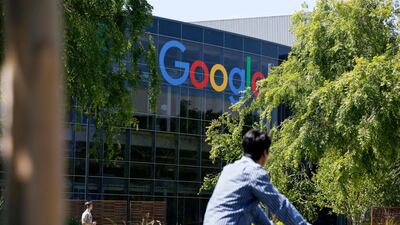Google chief executive Sundar Pichai has taken on a bigger role as the new chief executive of parent company Alphabet, replacing the co-founder Larry Page. Co-founder Sergey Brin is also stepping down from his role as the company’s president.
Here, The National examines the latest shake-up in the top management of the world's fifth-largest tech firm and one of the most valuable companies globally.
What is Alphabet?
Established in August 2015, Alphabet was born out of a corporate restructuring of Google. Google then became a wholly-owned subsidiary of Alphabet and all of its shares were automatically converted into the same number of shares of the latter. Alphabet separates Google from “other bets” that are not part of its core business. It currently owns more than a dozen companies including biotech firm Calico, self-driving car technology business Waymo, healthcare software company Verily, drone company Wing and investment subsidiaries GV and Capital G.
Who is Sundar Pichai?
An engineer-turned-manager, Mr Pichai became the new chief executive of Google in 2015, replacing Mr Page who moved on to run Alphabet along with Mr Brin. A product chief at the time, Mr Pichai was given the responsibility of overseeing Google search, Android, YouTube, Chrome, hardware, cloud computing and all of the company’s core businesses as the chief executive. An alumnus of Wharton Business School and Stanford University, Mr Pichai is credited for creating the Chrome browser and successfully took over the Android business from founder, Andy Rubin. A year after Mr Pichai took on Android, Google shipped 1 billion devices globally.
Will Larry Page and Sergey Brin completely retreat from Alphabet?
No. Though Mr Page and Mr Brin are stepping down, they will remain directors of Alphabet. They will, however, no longer oversee the company’s day-to-day operations.
"With Alphabet now well-established, and Google and the other bets operating effectively as independent companies, it’s the natural time to simplify our management structure," the co-founders said.
"We are deeply committed to Google and Alphabet for the long term."
Both founders still control more than 51 per cent of the company’s shares. As of April, Mr Page held 26.1 per cent of Alphabet's total voting power, Mr Brin 25.25 per cent and Mr Pichai less than 1 per cent.
Is the timing correct?
This new restructuring has come at the most difficult time in the history of the 21-year-old company. The tech giant is embroiled in several anti-trust probes initiated by both US and foreign regulators, in addition to battling internal frictions with its own employees, with many walking out from their jobs to express anguish over mishandling of sexual misconduct charges. They have also complained against the Dragonfly initiative, a censored search service in China. Mr Pichai has publicly acknowledged that the company is considering a search engine for China, saying it could offer “better information” to users than rival services but later abandoned the project due to mounting pressure.
Can Mr Pichai make Alphabet’s "other bets" profitable?
Although Alphabet continues to invest in future technologies — a category known as "other bets" — this continues to weigh on its bottom line. In the third quarter, ended September 30, "other bets" incurred an operating loss of more than $941 million (Dh3.45 billion). However, Google's core business remains highly profitable, generating an operating income of more than $10.8 billion. Overall, the company posted $40.5bn in revenue and a net income of $7.1bn for the third quarter.
Nevertheless, Google saw its slowest revenue growth in three years this year due to increased competition in advertising and stumbles in its smartphone business.


